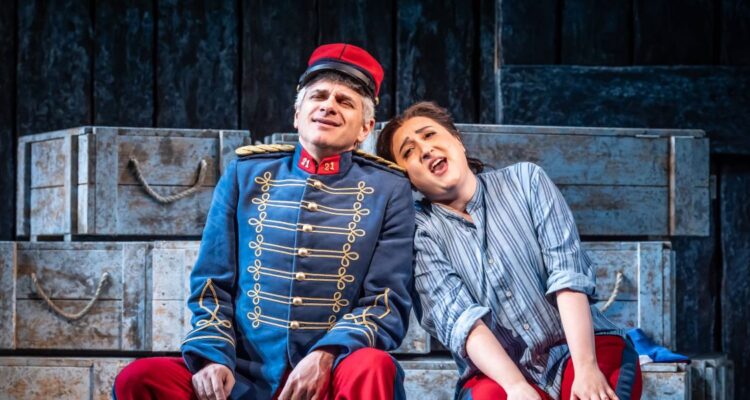‘The Daughter of the Regiment’ /’La Fille du Regiment’ (1840) is the best known of the five operas the indefatigable Donizetti wrote to French texts, and a refreshing reminder of his gifts for comedy and satire, often somewhat eclipsed by the fame of his operas on tragic historical or literary themes.
It tells the story of Marie, adopted as a regimental canteen girl, after being found abandoned as a baby on a battlefield. Part mascot, part regimental sweetheart, she falls for a local lad called Tonio, who happens to possess the best tenor top notes in the Tyrol. They are thwarted first of all by the fact that he is not a member of the regiment; but when he joins as a recruit a second obstacle looms into view in the subtantial shape of the Marquise de Berkenfield, allegedly Marie’s aunt, but in fact, in good operatic tradition, her mother. Marie is compelled to go with the Marquise to be re-educated into polite society and ultimate advantageous marriage, The second act consists of a delicious send-up of this life from which she is ultimately rescued by the whole regiment. Conventional pieties are defied, and tenor and soprano are re-united.
As you can infer from this summary, subtlety of characterisation is not the question here. But superlative vocal talent and technique certainly is, which perhaps explains why this work does not get performed more often, and why the go-to recording is still the one featuring Sutherland and Pavarotti. The vocal demands are fearsome, and in Julia Sitkovetsky and Nico Darmanin Grange Park Opera has secured two outstanding practitioners. Sitkovetsky is one of the reigning ‘Queens of the Night’, a role she wittily quotes from in an improvisatory moment near the end. She dispatches everything Donizetti throws at her with ease, together with presenting a warm and dynamic acting persona, just as the role requires. Similarly, Darmanin is at ease in the part, and picks off the row of ‘high Cs’ in his Act One number with the confidence of crack clay pigeon shot.
There are some lovely performances elsewhere too. Enrico Marabelli inhabits the crucial role of Sulpice with genial paternal plausibility and vocal heft; Harriet Thorpe provides presence and comic hauteur in the spoken role of the Duchess of Krakenthorp, and Henry Grant Kerswell offers a delightful cameo as the camp butler Hortensius. Only Anna Steiger as the Marquise is a bit vocally underpowered when set against the overall ensemble.
And it is the ensemble that impresses above all. The chorus that comprise the regiment are quite superb in their precision of attack and warmth of tone, whether in drinking or marching songs or more wistful numbers. As my companion said, ‘This is a toe-tapping opera’, and the credit for this rests ultimately with the singing soldiery.
Claire Levacher and the Gascoigne Orchestra impress from the pit. From the very opening horn and violin solos that start each act you know you are in the safe hands of a fine band of tip-top instrumentalists, and Levacher ensures not only a good balance between singers and players but a wide dynamic range including some ravishingly quiet moments in the more reflective numbers.
Co-directors John Doyle & Nikki Woollaston keep things moving throughout, particularly important in the first act when the setting in a barracks limits action to the forestage. Things open out delightfully in the second act with a lavish set for the Marquise’s ballroom, a showcase for some delicious social satire to contrast with the more rambunctious military elements in the first half. One of the finest moments in the work is when Marie’s massacring of a sentimental salon piece (it takes real talent to sing that badly!) is interrupted by the regimental ‘rataplan’. I cannot recall a funnier version of this number.
Overall this is a delightfully diverting evening that not even apocalyptical June downpours could depress: as a champagne operatic outing you will not find better this summer.
Music: Gaetano Donizetti
Libretto: Jules-Henri Vernoy de Saint-Georges, Jean-François Bayard
Co-Directors: John Doyle & Nikki Woollaston
Conductor: Claire Levacher
Cast includes: Nico Darmanin, Enrico Marabelli, Julia Sitkovetsky, Anna Steiger, Harriet Thorpe
Photo Credit: Marc Brenner
Until: 6 July 2024
4 hrs with long dining interval

